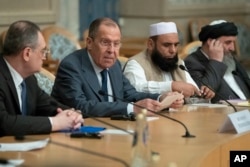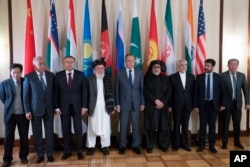Russia hosted a group of Afghan government-linked envoys along with their Taliban rivals Friday, as the Kremlin waded into efforts to end a 17-year conflict where Western efforts have repeatedly failed.
"Russia stands for preserving the one and undivided Afghanistan, in which all of the ethnic groups that inhabit this country would live side by side peacefully and happily," said Russian Foreign Minister Sergey Lavrov, in a statement opening the talks in Moscow.
"I am counting on you holding a serious and constructive conversation that will justify the hopes of the Afghan people," Lavrov added, calling for "a new page in the history of Afghanistan."
Despite the lofty rhetoric, Russian officials were careful to keep expectations low in advance of the event. Talks were billed as negotiations aimed at merely securing future peace talks — with success defined as merely getting the two sides to sit together at all.
Two earlier high-profile Russian efforts to organize talks were canceled at the last minute after the Afghan government refused to participate.
While this time was no different — officials in Kabul again rejected direct participation — a face-saving workaround solution came by the inclusion of envoys from the government-appointed High Peace Council. The council does not represent the government but oversees peace efforts.
In realistic terms, however, the talks produced little but acrimony.
In a statement following the talks, High Peace Council representatives said they had asked Taliban representatives "to determine a place and time for the start of those talks in the near future." Those negotiations, the representatives added, could proceed "without conditions."
Yet Taliban officials demanded that foreign forces — specifically, the United States and NATO — leave Afghan territory before negotiations with the government in Kabul could begin.
"If the external dimension is resolved, then we can resolve the internal, including questions about the constitution, questions of human rights, women, problems with narcotics and all internal problems," said an official in a statement following the talks.
The council, in turn, rejected the Taliban's "preconditions" outright.
Eleven nations were present for the talks, including regional powers China, Pakistan and Iran. The U.S. Embassy in Moscow confirmed it had sent an observer to the meeting.
Washington has repeatedly voiced skepticism of the Russian initiative, which some say undercuts the U.S.'s peace efforts, led by special adviser Zalmay Khalilzad.
Meanwhile, the Russian effort was the latest sign of the Kremlin's growing role as a powerbroker — a role Russian officials seemed to relish as the U.S.-led NATO military operation in Afghanistan, 17 years and counting, has struggled.
"It's unacceptable to try to turn Afghanistan into a field of competition for outside players, as it makes for bad consequences," said Foreign Minister Lavrov, in a thinly veiled reference to Afghanistan's reputation, dating back centuries, as the "Graveyard of Empires."
And yet, Lavrov's criticism was a cautionary tale for Moscow as well.
In 1979, the then-Soviet Union launched an occupation of Afghanistan, becoming a decade-long conflict that ended with the humiliating withdrawal of Soviet troops.
Within two years, the USSR was no more.






